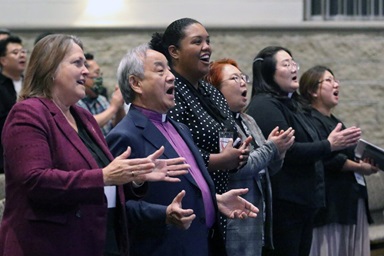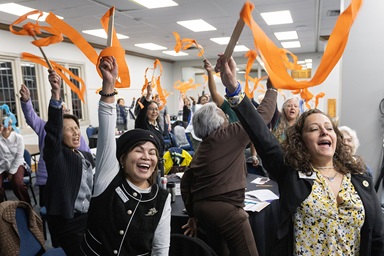
Key Points:
- General Conference has adopted a resolution condemning discrimination and violence against racial-ethnic ministries, especially Asian Americans, during the COVID-19 pandemic and beyond.
- The resolution’s sponsor, the New Federation of Asian American United Methodists, includes Filipino, Chinese, Japanese, Korean, Indian, Pakistani, Middle Eastern, Vietnamese, Cambodian, Malaysian, Nepali and Indonesian members.
- “We will not be afraid and stop demonstrating our love for all people of color,” said the Rev. Nelson L. Castorillo. “The United Methodist connection is still the best denomination that we have in the world that confronts social issues, injustices and human suffering.”
The United Methodist Church has approved a resolution condemning racial-ethnic discrimination and gender-based violence against Asian Americans.
The denomination’s top lawmaking assembly approved the resolution, submitted by the New Federation of Asian American United Methodists, in a plenary session on May 1.
The resolution condemns increasing discrimination against racial-ethnic minorities, especially Asian Americans, during the COVID-19 pandemic and beyond. It condemns the violations against religious minorities in India, including the recent demolition and burning of churches and schools in the northeastern state of Manipur.
“Gender-based violence is a shadow pandemic,” the resolution states. It calls upon the United Methodist Commission on Religion and Race, the Commission on the Status and Role of Women and United Women in Faith to provide training that addresses gender-based violence as well as trauma-healing resources for racial-ethnic minority women and girls who continue to experience the impact of COVID-19. It also calls on annual conferences to urge local churches to be informed and to work against discrimination and gender-based violence.
The Rev. Scort Christy, president of the federation, said The United Methodist Church strengthens its ministries to the Asian American churches through the organization.
“This racial-ethnic caucus comprises Filipino, Chinese, Japanese, Korean, Indian, Pakistani, Middle Eastern, Vietnamese, Cambodian, Malaysian, Nepali and Indonesian (members),” he said.
“NFAAUM emphasizes linkage and the empowerment of the Asian American churches to advocate for the causes before the boards and agencies of the UMC,” he said. The federation coordinates programs, promotes ministries and “encourages the participation of Asian American United Methodists in all aspects of the life of The United Methodist Church,” he said.
The racial-ethnic caucus gathered on April 28 at First United Methodist Church, Charlotte, to discuss how the federation addresses needs, interests and concerns in empowering Asian American United Methodists. Those at the gathering also addressed the issue of violence.
The Rev. Nelson L. Castorillo oversees the federation’s ministries with the poor, as well as youth and young adult advocacy for peace with justice. He is also an executive committee member of the Asian American Language Ministry, one of the denomination’s ethnic ministry plans.

General Conference photos
“The General Conference created the Asian American Language Ministry to empower the 12 Asian caucuses to confront the many challenges,” he said in an interview. “ … The leaders of the AALM are in charge of making sure that all Asians, wherever they may be, will be able to defend themselves, protect themselves and help each other in the midst of these attacks.”
Despite ongoing advocacy and legislation to combat anti-Asian racism, about a third of Asian Americans and Pacific Islanders say they have experienced an act of abuse based on their race or ethnicity in the last year, including being on the receiving end of verbal harassment, slurs, physical threats or cyberbullying.
The Rev. Neal Christie, executive director, Federation of Indian American Christian Organizations of North America, said the church has a responsibility to educate and advocate.
“From the mainstreaming of hate and the failure of social media platforms to adequately address disinformation,” he warned, “the climate is open to opportunities for the trend of increased hate to continue. Every congregation has a responsibility to educate, reach out to and advocate for and alongside Asian Americans and Arab Americans.”
Subscribe to our
e-newsletter
Christie acknowledged the time delegates spend in reading hundreds of petitions,
“Can we take this energy and commitment and apply it to eradicating crimes against Asian Americans and Arab Americans?” he asked. “I believe we can also advocate for anti-racist policy at the state level and the federal level.”
Christie said the question of Asian hate domestically is only part of the problem. He stressed that any form of ethnic or racial hate that is weaponized by religion should be of grave concern.
“In India,” he explained, “they do not see anti-Asian hate, but religion weaponized to promote hate through public policies that scapegoat and deny the human rights for religious minorities, like Christians, Muslims, Sikhs, lower-caste people and rural Indigenous people.
“We must move beyond vigilance and observation of the harm that has been done toward vulnerable, racial and ethnic people, especially Asian Americans. We must be in solidarity and dismantle those policies and perspectives that promote superiority for some.
“The church will become beautifully regional and increasingly decolonized,” he said. He added that “Asian Americans, who are diverse by vast geography and language and histories, have something to teach The United Methodist Church about what it means to live into regionalization.”
In discussions about anti-Asian hate or hate crimes, as well as international and domestic human rights, Christie said he sees “a connection between religious nationalism, global migration, international insecurity and the denial of human rights.”
“Religion is increasingly weaponized to deny economic, social, political and human rights that are guaranteed by the Universal Declaration of Human Rights,” he continued. “This is true for the Philippines. This is true for India. This is true increasingly across Asia.”
Pieter Friedrich, an independent journalist and author focused on the rise of the Hindu nationalist movement, attended the gathering.
He thanked The United Methodist Church “for leading the way and setting an example for the American church by being the first denomination to raise the issue of persecution of Christians and other religious minorities in India,” Friedrich said. “Such actions are crucial to creating the church of the future, one where we work to defend the dignity of all and use our voices to support God’s suffering servants around the globe.”
“We will not be afraid and stop demonstrating our love for all people of color,” Castorillo said. “The United Methodist connection is still the best denomination that we have in the world that confronts social issues, injustices and human suffering.
"Our denomination … boldly acknowledges the difficulties of human existence. I am excited about the future of this new development happening in The United Methodist Church.”
Mangiduyos is a UM News correspondent. News media contact: Julie Dwyer at (615) 742-5470 or [email protected]. To read more United Methodist news, subscribe to the free daily or weekly Digests. Rio Anne B. Dizon contributed to this report.



